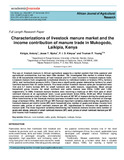| dc.contributor.author | Kirigia, A | |
| dc.contributor.author | Njoka, J T | |
| dc.contributor.author | Kinyua, P I D | |
| dc.contributor.author | Young, T P | |
| dc.date.accessioned | 2015-04-01T07:30:56Z | |
| dc.date.available | 2015-04-01T07:30:56Z | |
| dc.date.issued | 2013 | |
| dc.identifier.citation | Kirigia, A., Njoka, J. T., Kinyua, P. I. D., & Young, T. P. (2013). Characterizations of livestock manure market and the income contribution of manure trade in Mukogodo, Laikipia, Kenya. African Journal of Agricultural Research, 8(46), 5864-5871. | en_US |
| dc.identifier.uri | http://hdl.handle.net/11295/81855 | |
| dc.description.abstract | The use of livestock manure in African agriculture supports a market system that links pastoral and
agricultural communities, but has been little studied. We investigated this market in central Kenya.
Out of 60 households interviewed, all had livestock and 81% were involved in livestock manure trade.
Livestock manure from rangelands is marketed directly to individual traders or brokers (76%), farmers
(20%), and horticultural growers (4.6%). There was a significantly greater demand by farmers for small
ruminant manure than for cattle manure. The mean annual livestock manure sales per household were
10.8 and 5.7 metric tonnes (MT) for small ruminant and cattle manure, respectively. Mean annual
household gross income for small ruminant and cattle manure was KShs. 3,450 and 1,350,
respectively. In 2006, livestock manure brokers were receiving a mark-up of 90% from sale of small
ruminant manure at an agricultural town. Local government levies KShs. 92.90 per MTof livestock
manure and received a total of Kshs. 54,532 from the sale of 587 MT of manure during the study period.
Other beneficiaries to the livestock manure business included truck loaders who received an average
wage of between KShs. 200 and 270 per MT.Themost important variables determining the quantities of
livestock manure per metric tonne (MT) were household size, number of goats and sheep, income from
manure sale, prices of small ruminant manure per MT, hypothesized to influence the quantities of
manure sold. The most important variables determining the livestock manure income were number of
goats and sheep, amount of small ruminant manure (MT) sold, prices of small ruminant manure per MT
and income from livestock sale. | en_US |
| dc.language.iso | en | en_US |
| dc.publisher | University of Nairobi | en_US |
| dc.title | Characterizations of livestock manure market and the income contribution of manure trade in Mukogodo, Laikipia, Kenya | en_US |
| dc.type | Other | en_US |
| dc.type.material | en_US | en_US |


